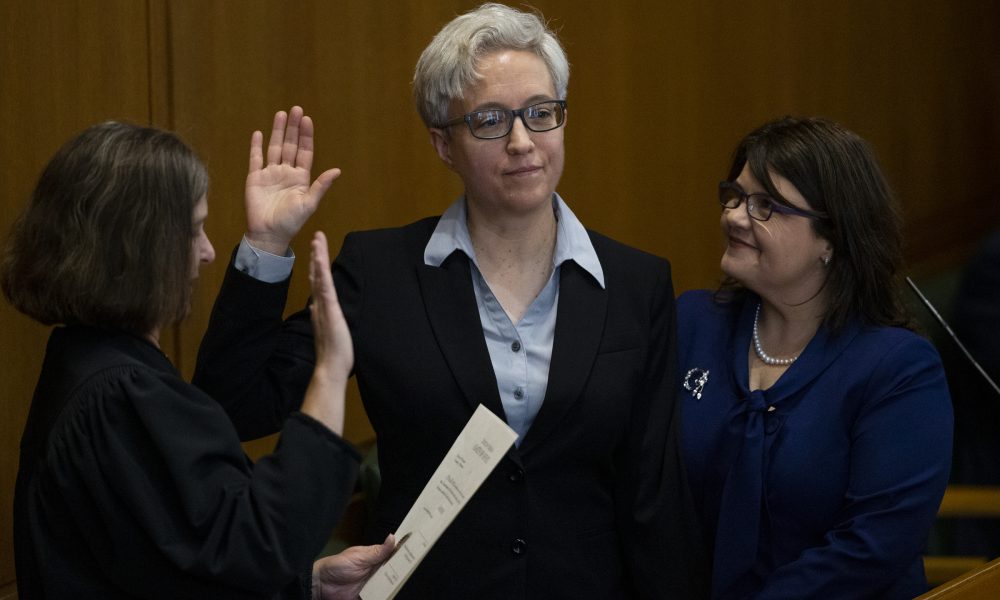Gov. Tina Kotek on Tuesday declared that much of Oregon is in a state of emergency because of homelessness and created a new state council with the aim of building thousands more homes a year.
Kotek signed three executive orders in a temporary ceremonial office in Salem on Tuesday afternoon, just 24 hours after she was inaugurated. She described the orders, as well as a $130 million funding request she’ll make to the Legislature, as first steps in addressing the state’s homelessness crisis.
“It’s going to take time,” Kotek said. “We’re not going to build all this in the first year. But we have to ramp up. We have to be ambitious. We have to work hard.”
At least 18,000 Oregonians were homeless on a single night in 2022, according to the U.S. Department of Housing and Urban Development’s point in time count. Advocates have long acknowledged that the count underestimates the homeless population – it includes people in designated shelters or who can be found on the streets, but it misses people in nontraditional shelters or those staying with family or friends because they don’t have homes of their own.
More than 60% of Oregon’s homeless population sleep on the streets or in cars, according to the executive order. That’s the fourth-highest rate of unsheltered homelessness in the country, and the nation’s highest rate of unsheltered homelessness for families with children.
Kotek’s state of emergency applies to the Portland area, central Oregon and Lane, Jackson, Marion and Polk counties, home to Eugene, Medford and Salem. Homelessness in those areas increased by more than 50% between 2017 and 2022.
A separate executive order directed state agencies to prioritize reducing homelessness throughout the state: About 4,000 of the estimated 18,000 homeless Oregonians live in rural areas that aren’t covered by the state of emergency and haven’t seen the same increases in homeless rates.
Her state of emergency directs Oregon Housing and Community Services to use up to $40 million of its current budget to respond to homelessness.
Declaring a state of emergency means the Oregon Department of Emergency Management can coordinate state agencies, employees and equipment to address the homelessness crisis more quickly than it otherwise could.
“It’s setting up an incident command structure and emergency management structure similar to what we do when there’s a natural disaster,” Kotek said. “This is a man-made disaster. This is a humanitarian crisis.”
Housing production council
The third executive order creates the Governor’s Housing Production Advisory Council, with up to 25 members including the directors of Oregon Housing and Community Services and the Department of Land Conservation and Development, a member of a recognized Oregon tribe and members nominated by legislative leaders of both parties.
Kotek said she hopes to get the advisory council appointed as soon as possible so it can recommend how to meet a goal of building 36,000 homes per year by April 1. That allows legislators, who must adjourn by June 25, to pass policy changes recommended by the council.
Oregon has built about 20,000 homes per year over the past five years. A recent housing needs analysis found a current shortage of 140,000 homes and the need to build more than 500,000 over the next 20 years to keep pace with demand.
The need for homes exists across all income levels, but it’s greatest among low-income Oregonians. The housing analysis found that more than half of the 36,000 homes that need to be built each year should be affordable to people who earn less than 80% of the median income in the area.
More money coming
Kotek said she’ll soon ask the Legislature to appropriate $130 million to build more transitional shelters, provide services to people currently living on the streets and prevent people from losing their houses. She’ll include more funding for housing and homelessness in her full proposed budget, which will be released by Feb. 1, but she said the $130 million is an early investment.
That money is intended to get 1,200 people off the streets, a cost of more than $100,000 per person. But that figure also includes construction costs to build new shelters and rent assistance to prevent homelessness.
House Democrats have said housing and homelessness are top priorities. Speaker Dan Rayfield said Monday that lawmakers plan to pass a housing spending package within the first 60 days of the legislative session. Kotek said she plans to meet with legislative leaders as soon as next week to discuss their plans, and that she thinks the two plans will complement each other.
Sen. Kayse Jama and Rep. Maxine Dexter, Portland Democrats who chair their chamber’s housing committees, said in a joint statement that they supported Kotek’s executive orders.
“This is a moment for leaders at every level of government and in every industry to come together to solve this humanitarian crisis,” they said. “We hope and expect the executive orders will be the catalyst for the change Oregon needs.”
Kotek will also meet with a coalition of mayors who are seeking nearly $125 million in ongoing funding for cities to address homelessness. The mayors’ request relies on cities receiving $40 per resident.
“I’ve been talking to local mayors just today in the metro area in particular saying, ‘Here’s what’s happening. We want to work together, we’re going to partner and it’s not an either-or. We need to do this and we need to consider your proposal because there’s a lot at stake,’” Kotek said.
Oregon Capital Chronicle is part of States Newsroom, a network of news bureaus supported by grants and a coalition of donors as a 501c(3) public charity. Oregon Capital Chronicle maintains editorial independence. Contact Editor Lynne Terry for questions: [email protected]. Follow Oregon Capital Chronicle on Facebook and Twitter.
STORY TIP OR IDEA? Send an email to Salem Reporter’s news team: [email protected].

Julia Shumway is deputy editor of Oregon Capital Chronicle and has reported on government and politics in Iowa and Nebraska, spent time at the Bend Bulletin and most recently was a legislative reporter for the Arizona Capitol Times in Phoenix. An award-winning journalist, Julia most recently reported on the tangled efforts to audit the presidential results in Arizona.









